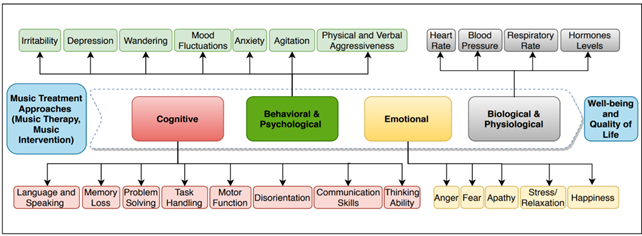Dementia is an umbrella term for several progressive diseases such as Alzheimer’s that affect memory, language, problem-solving, and the individual’s thinking ability, which interfere with their daily living activities. People living with dementia (PWD) usually face social and communication interaction problems, which negatively impacts on their lives and the people around them.
- dementia
- music
- music intervention
1. Introduction
There are various kinds of therapy methods for managing dementia symptoms: pharmacological and non-pharmacological. Although evidence shows that pharmacological therapy can delay and somewhat control behavioral disorders in PWD, it cannot cure dementia [1][2]. Some popular non-pharmacological therapies are pet therapy [2][3], robot therapy [3][4], reminiscence therapy [4][5], aromatherapy [5][6], occupational therapy [6][7], massage and touch therapy [7][8], doll therapy [8][9], light therapy [9][10], and creative arts therapies (music, dance-movement, and drama)[10][11]. Music interventions are categorized as ’music medicine’ when individuals listen to pre-recorded music that is offered by medical personnel [11][12]. In contrast, music therapy is clinical and evidence-based use of music interventions to accomplish individualized goals within a therapeutic relationship by a credentialed professional who has completed an approved music therapy program [12][13]. Unlike drug therapy, applying music as a treatment approach usually does not have any side effects. For this reason, many physicians and caregivers promote and encourage music therapy, or music intervention as a beneficial and alternative treatment method for dementia [13][14]. Although using music as a treatment approach cannot cure dementia symptoms, it can reduce the symptoms [14][15]. Even with advanced dementia—when PWD have severe problems with judgment, planning, reasoning, speech, and language— their responses to music are undeniable, and its impact can last for hours or even days [15][16].
2. Benefits of Music Treatment for People Living with Dementia
Several physiological and psychosomatic benefits of music have been mentioned in the literature.
- Biological/physiological: The physiological effect of music helps to balance vital signs such as blood pressure, heart rate, respiratory rate, and hormone levels [16][17].[17,18].
- Behavioral and psychological: The psychological effects of music help to reduce mood fluctuations and behavioral disorders such as depression, agitation, and aggression [18][19][20].[2,19–21].
- Cognitive: Music also boosts communication skills, the quality of life, well-being, intimacy, memory, self and environmental awareness, the ability to distinguish between the surroundings and moments of the day, and managing pain [21][22]. Among all music advantages, some of the most important ones are enhancement in language skills, verbal and non-verbal expressions, improvement of social activity and communication, raising cognitive levels, and self-awareness [18][23]. PWD who have verbal communication problems can benefit from music as a non-verbal communication solution to express themselves without inhibitions.
- Music also boosts communication skills, the quality of life, well-being, intimacy, memory, self and environmental awareness, the ability to distinguish between the surroundings and moments of the day, and managing pain [17,22,23]. Among all music advantages, some of the most important ones are enhancement in language skills, verbal and non-verbal expressions, improvement of social activity and communication, raising cognitive levels, and self-awareness [19,24]. PWD who have verbal communication problems can benefit from music as a non-verbal communication solution to express themselves without inhibitions.
- Emotional: Music engages the individual’s attention (apathy) and helps them enjoy their life, improves their self-esteem, and communication, which leads to improvement in behavior [24]. People living with dementia who listened to their favorite music were observed to have a decrease in stress level and an increase in relaxation and happiness [25].[25]. People living with dementia who listened to their favorite music were observed to have a decrease in stress level and an increase in relaxation and happiness [26].
To retain the music benefits, people with dementia need to receive regular music treatment, which is approximately two to three times a week [26]. Overall, studies from the last 10 years have shown improvement in cognitive, emotional, and behavioral and psychological symptoms of PWD through music treatment approaches, resulting in a better quality of life and wellbeing (Figure 1).
To retain the music benefits, people with dementia need to receive regular music treatment, which is approximately two to three times a week [27]. Overall, studies from the last 10 years have shown improvement in cognitive, emotional, and behavioral and psychological symptoms of PWD through music treatment approaches, resulting in a better quality of life and wellbeing (Figure 1).
Figure 1. Benefits of music treatment for people living with dementia (PWD).

